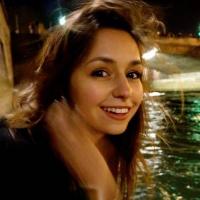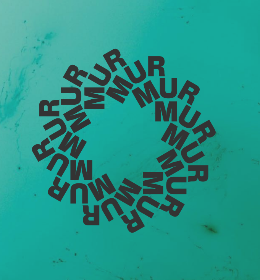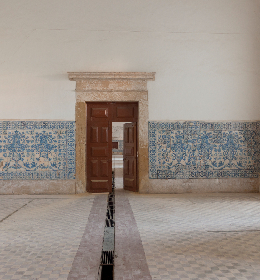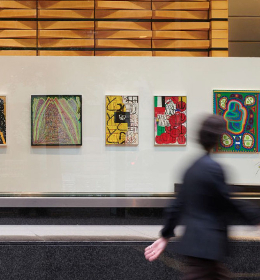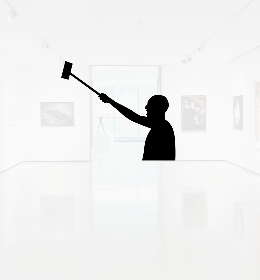Although the extensive body of work on display at the Swiss institution ranges greatly in terms of its scope and angle — commenting on a plethora of different issues, from the ethics of mass production to “post-truth” facts and viral data circulation — the exhibition focuses on a recurring theme in Bajevic’s artistic practice: Power. More specifically, the exercise of power by political, economic, and religious authorities and how their mechanisms of control become inscribed and entrenched in individual worldviews.
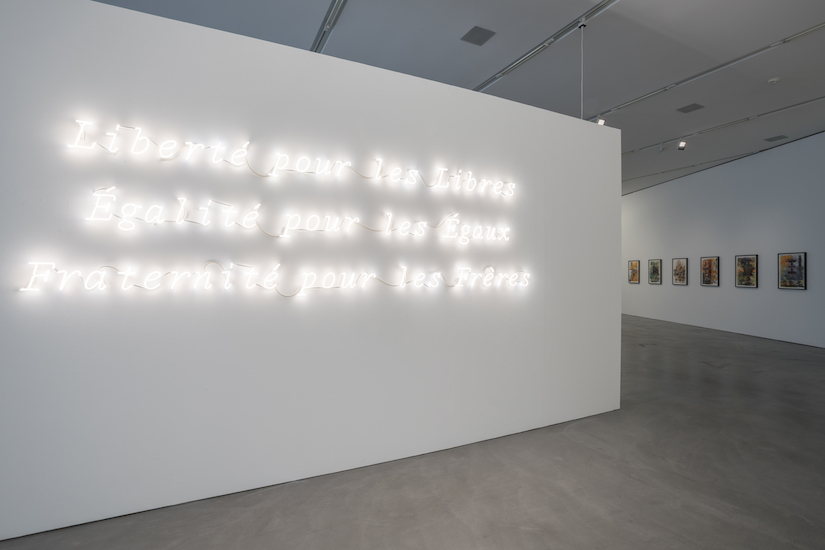
Liberté pour les Libres Égalité pour les Égaux Fraternité pour les Frères*
*Based on actual events (2017)
The French-Bosnian artist, born in 1967, in Sarajevo, Bosnia-Herzegovina, has spent the last two decades living and working in Paris, examining the power-relations at play across artistic and political landscapes — developing a keen eye for topical issues that reveal the (sometimes paradoxical) nature of Power in contemporary society. Questions raised by Bajevic include, but are not limited to: What constitutes Power? A government, a border, a voice, an aesthetic? Furthermore, what lies at the root of all ‘Power’ — or more pertinently, what makes ‘Power’ powerful?
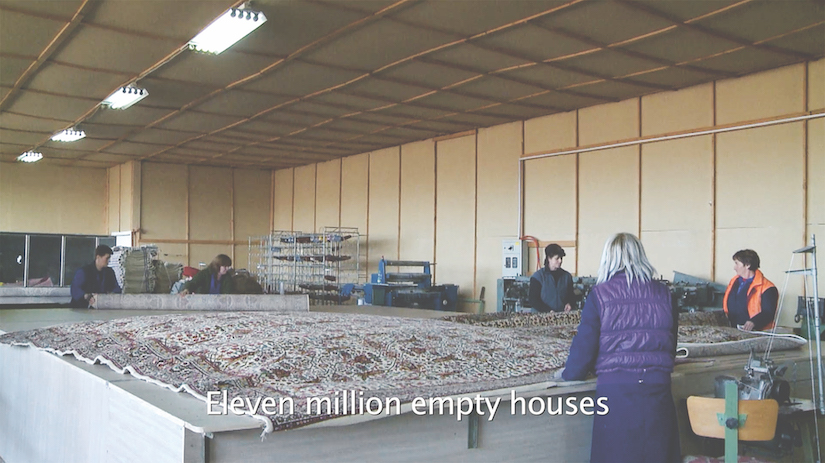
Arts, Crafts, and Facts (2012)
Does Power lie in the segregation and dissolution of communal strength, as exhibited by works such as I’m Eating Somebody Else’s Bread (2006) and Arts Crafts and Facts (2015)? The latter, a 22-minute video projection that sees a choir of workers in a textile factory break into song, whilst a group of predominantly female workers continue to relentlessly produce huge embroidered carpets. The lyrics speak, not of a naive sing-song solidarity, but of concrete matters, such as the profound impact of minor fluctuations in the global financial market have on working class people. The video reflects the neatly embroidered cotton cloth graphs displayed opposite, illustrating the fluctuation of oil, coal and gas prices, alongside income and average wage rates — the literal materialisation of economic power and its exploits.
Whatever constitutes Power — whatever organs its body relies upon to function and sustain itself — Power is measured according to its effect: according to its impact on others, whether they be factory workers, or artists, whose national identity has been commodified by the art market in order to spur trends or sales. (As seen in Art Has To Be National, 2012.)
Art Has To Be National (2012)
Power’s ability to control and dominate, however, is reliant on its tools of implementation. Namely, on propaganda. Bajevic’s practice sees her seek out these instruments of Power by questioning the boundary between facts and targeted government or religious propaganda. As a result, her work often strategically mimics practices of authoritarian control, whilst radially displacing them by taking them out of context and enacting them herself. In this sense her work often straddles a tricky duality — criticizing the instrument of propaganda whilst embodying its form of expression.
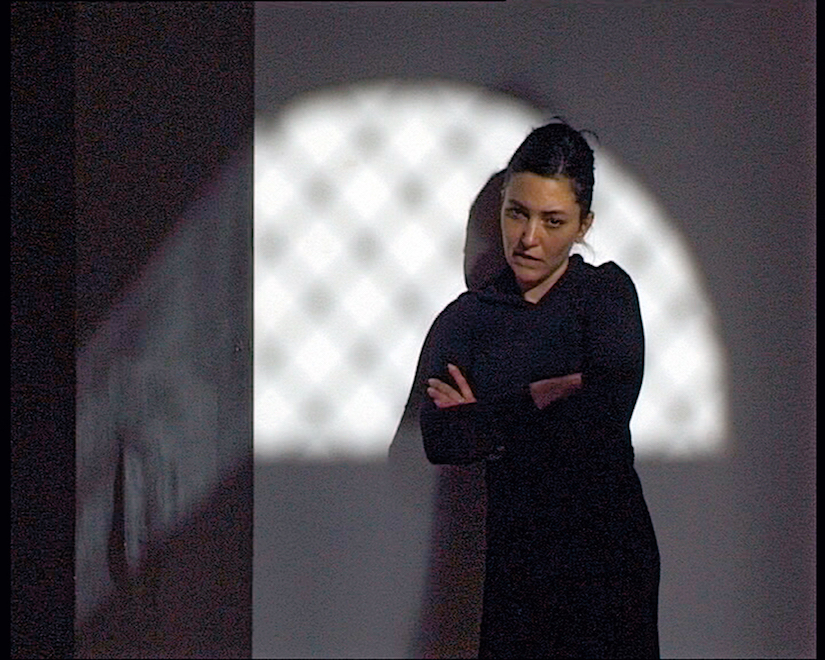
Double Bubble (2001)
Double Bubble (2001) does exactly this. In the video performance, we see the artist directing ambiguous contradictory messages at an unidentified addresse. “I don’t eat pork, I don’t drink during Ramadan. But I take Ecstasy.” “My religion doesn’t allow me to sleep with women. So I sleep with boys.” The statements provoke profound uneasiness in the viewer — simultaneously unmasking religious hypocrisy and people’s uncritical acceptance of religious doctrines, whilst confronting the easiness with with one can typecast an entire people.
Her most recent work, the sculptural installation Hide and Seek (2017) made specifically for the exhibition, tackles the 2016 phenomenon of “post truth” information and “fake news” facts. The work draws attention to contemporary politics and its gradual descension into obscurity, by randomly pulling information from encrypted networks, translating them into Morse code. The Morse code is then translated and relayed through light bulbs hung on the metal frame. The fact machine, illuminating the masses, quickly comes to represent an obscure metal mass, playing a peculiar game of hide-and-seek with itself.
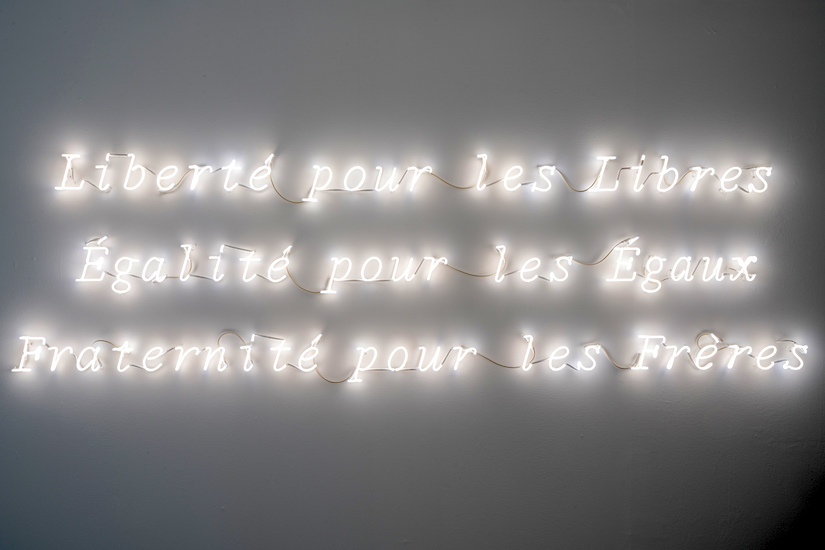

Liberté pour les Libres Égalité pour les Égaux Fraternité pour les Frères* (2017) | Hide and Seek (2017)
Using a variety of media, from morse code lighting installations to brightly colored photo montages, Bajevic is able to pick apart and confront major issues such as globalisation, immigration, exploitation, marginalisation, neo-liberalism and religion — all, whilst asking particularly uncomfortable questions as to where these forces of power come from and how they are being enforced.

I Believe More in Horoscope Than in Nationalties (2006/17)
‘Power, Governance, Labour,’ is currently on at the Migros Museum für Gegenwartskunst in Zürich, through August 13.



